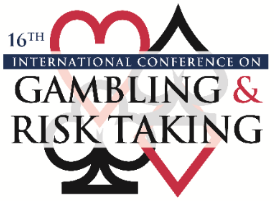Session Title
Session 4-1-A: Getting Gamblers to Get Help
Presentation Type
Event
Location
The Mirage Hotel & Casino, Las Vegas, Nevada
Start Date
10-6-2016 8:30 AM
End Date
10-6-2016 10:00 AM
Disciplines
Gaming and Casino Operations Management | Health Policy | Inequality and Stratification | Mental and Social Health | Models and Methods | Policy Design, Analysis, and Evaluation | Policy History, Theory, and Methods | Political Theory | Public Administration | Public Affairs, Public Policy and Public Administration | Social Psychology and Interaction | Sociology | Statistics and Probability | Substance Abuse and Addiction | Theory, Knowledge and Science
Abstract
While many studies have examined self-exclusion few have focused on the processes through which gamblers return at the end of their agreements. In 2014, the RGC Centre for the Advancement of Best Practices examined voluntary self-exclusion reinstatement and renewal in an effort to develop evidence-informed best-practices for both land-based and online gambling operations. The presentation outlines the findings of the study and the recommended best practices for reintegration and ban renewal.
The study examined a range of practices around the world. In the end the study recommended an active reinstatement process in which all participants are required to apply to return to the venue. The study also outlines a series of steps to reinstatement that takes into account the risks to the individual and the venue. Those who are found to have significant markers of gambling risks are required to participate in educational or support services before reinstatement is available. For those who complete their self-exclusion term without such markers, these services are offered on a voluntary basis. Active renewal of self-exclusion (i.e., an extension of the voluntary self-ban) is also available for those who want it.
This best-practice research included a literature review, a review of self-exclusion training and procedural documents, key-informant interviews with gaming venue employees, two focus group discussions with players experienced with self-exclusion, and a round table panel discussion with experts. Findings are published in a report entitled Insight 2014: Best Practices for Self-Exclusion Reinstatement and Renewal by the Responsible Gambling Council.
Keywords
self-exclusion, responsible gambling, reinstatement, self-ban, red-flag behaviors, gambling risk markers, best-practice research, self-exclusion renewal, self-exclusion revocation
Streaming Media
Included in
Gaming and Casino Operations Management Commons, Health Policy Commons, Inequality and Stratification Commons, Models and Methods Commons, Policy Design, Analysis, and Evaluation Commons, Policy History, Theory, and Methods Commons, Political Theory Commons, Public Administration Commons, Social Psychology and Interaction Commons, Statistics and Probability Commons, Substance Abuse and Addiction Commons, Theory, Knowledge and Science Commons
Best Practices for Self-Exclusion Reinstatement and Renewal
The Mirage Hotel & Casino, Las Vegas, Nevada
While many studies have examined self-exclusion few have focused on the processes through which gamblers return at the end of their agreements. In 2014, the RGC Centre for the Advancement of Best Practices examined voluntary self-exclusion reinstatement and renewal in an effort to develop evidence-informed best-practices for both land-based and online gambling operations. The presentation outlines the findings of the study and the recommended best practices for reintegration and ban renewal.
The study examined a range of practices around the world. In the end the study recommended an active reinstatement process in which all participants are required to apply to return to the venue. The study also outlines a series of steps to reinstatement that takes into account the risks to the individual and the venue. Those who are found to have significant markers of gambling risks are required to participate in educational or support services before reinstatement is available. For those who complete their self-exclusion term without such markers, these services are offered on a voluntary basis. Active renewal of self-exclusion (i.e., an extension of the voluntary self-ban) is also available for those who want it.
This best-practice research included a literature review, a review of self-exclusion training and procedural documents, key-informant interviews with gaming venue employees, two focus group discussions with players experienced with self-exclusion, and a round table panel discussion with experts. Findings are published in a report entitled Insight 2014: Best Practices for Self-Exclusion Reinstatement and Renewal by the Responsible Gambling Council.


Comments
Attached: PDF containing 38 slides
Audio recording of session is attached as a downloadable MP3 audio file, 79.01 MB